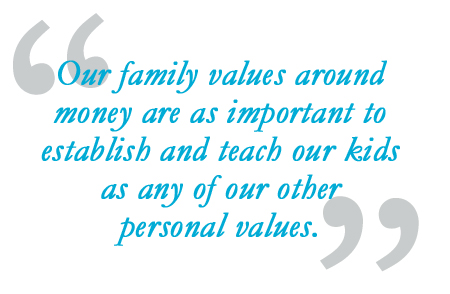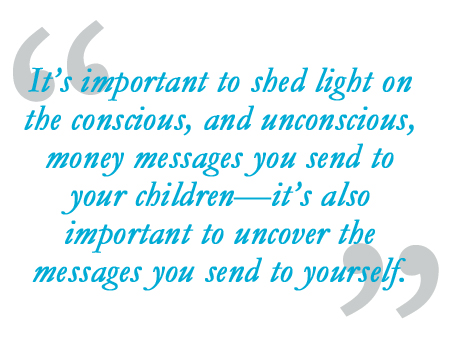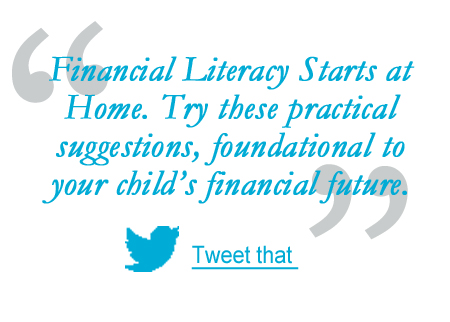By Sheila Walkington, Co-Founder and CFO Money Coaches Canada

When it comes to topics of money and Canadians, Money Coaches Canada has a great vantage point. Through our interactions with clients, our involvement with the media, our frequent blog posts and our social media connections—we are in the privileged position of hearing Canadians’ hopes, interests, aspirations and concerns related to money and personal finance.
Over the years, we have written extensively on nearly every topic related to personal money management. One of the topics that elicits the greatest response is kids and money. And the comment we hear most is: “I wish I had learned to handle money sooner.”
When it comes to teaching kids about money, there are a lot of different opinions on how, and where (at school or at home?) it should be done. But there is agreement on one thing; kids need a financial education so that they can make intelligent choices about money at every stage of life.
I’d like to share with you, my thoughts on this incredibly important topic.
It’s Important to Start Now
It has always been important to teach kids about money, but never more so than today. Why? Because we live in a culture where money moves quickly—and almost invisibly thanks to debit and credit cards—and where debt, unfortunately, is often accepted as inevitable. (It’s not).
Items that were grown-up luxuries not very long ago, like smart phones and tablets, can be seen in the hands of kids well under 10 years-old. And marketers know that. They know how much over-worked or divorced parents want to make their kids “happy.” Marketers know that kids influence family spending in ways they did not in generations past.
Those young eyes are bombarded by advertising through channels that didn’t exist in our childhoods. Through channels that didn’t exist even 5 years ago! We can’t wait until our kids are teenagers, or even tweens, before we start talking to them about money.
 But not only are our kids learning about consuming from the world at large, they are learning from us. We are all under pressure, we are all being sold the message that our success as parents can be measured by what we can afford to provide our family: the vacations, the big house, the tech toys, the “in” clothing and shoes. This measure of success is not really new, but the cost and expectations keep going up—as does Canadian household debt.
But not only are our kids learning about consuming from the world at large, they are learning from us. We are all under pressure, we are all being sold the message that our success as parents can be measured by what we can afford to provide our family: the vacations, the big house, the tech toys, the “in” clothing and shoes. This measure of success is not really new, but the cost and expectations keep going up—as does Canadian household debt.
Our family values around money are as important to establish and teach our kids as any of our other personal values. As parents we need to be tuned into the fact that indulging our kids is not the same as providing for their welfare. Every time we spend money because of how it makes us feel about ourselves, we are running the risk of setting our kids up for financial failure in the future.
A Role for Our Schools
Many parents express the wish that our schools would do a better job teaching money management. I agree that our schools have a role to play in teaching kids the fundamentals, but money is bound up with personal values and those need to be taught and practiced at home.
So, while the classroom is a good place to teach the power of compound interest, and many other foundational money skills (like balancing a cheque book), at the end of the day, a child’s financial education has less to do with math and more to do with role models. And the most powerful role model for a child is their parents.
What we value as individuals, and as families, is incredibly personal. Our values reflect our own upbringing, and our unique circumstances, challenges, and goals. We as parents have to ensure that our kids develop healthy emotions and behaviours towards money, we cannot expect our school system to do that.
Home is the Place Where Kids Learn the Most Important Lessons
As an adult, the relationship you have with money is a reflection or rejection of what you saw in your childhood. And positive or negative, it impacts your self-esteem, your relationships and your earning potential.
 It’s important to shed light on the conscious, and unconscious, money messages you send to your children—it’s also important to uncover the messages you send to yourself. Make sure your language and habits around money are positive, so that they serve you, as well as your kids, over the long term.
It’s important to shed light on the conscious, and unconscious, money messages you send to your children—it’s also important to uncover the messages you send to yourself. Make sure your language and habits around money are positive, so that they serve you, as well as your kids, over the long term.
Like it or not, your child’s future will be significantly affected by how you use money on a day-to-day basis. Kids learn our values from what we do, more than by what we say. And they start watching us from a very young age. If money causes stress and arguments in the home, kids will internalize negative feelings around money. The good news is, if money is talked about in a positive way, as a tool, even when there are challenges, kids will internalize those positive feelings.
But the truth is—many adults have no idea how to start teaching their kids about money. Which is why, I guess, so many people would like the schools to take on the role of financial literacy. But it’s not as difficult as it seems, here are some ideas to get started.
Some Practical Suggestions to get Started
Think of these ideas as a way to set your kids up for success, and maybe even as an opportunity to challenge some of your own habits around money. You may find that your own money confidence grows along with your kids.
7 Things You Should be Teaching your Kids about Money:
- Use cash more often. Swiping or tapping a plastic card doesn’t demonstrate to a child that a give and take transaction has taken place. Paying for gum doesn’t appear any different than paying for a cart load of groceries. Using cash and getting change is less abstract, to your child—and to you.
- Give your kids a consistent weekly or bi-weekly allowance, and provide clear guidelines on what they are expected to pay for.
- Let them make mistakes. If they spend their whole allowance and can’t afford to go with friends to the movies, don’t lend them money. It may seem harsh, but lending them the money makes you their “credit card” and the goal is to teach them to plan and save, not to start into the cycle of debt at 12 years-old.
- Talk to them about financial goals. Get them excited about something that will take a while to save for, and help them make a plan. Congratulate them every time they put some of their allowance toward the goal and celebrate when they achieve it. If kids feel pride in achieving financial goals, it’s something they will continue in their future.
- Also, talk to them about family goals and teach them about priorities. “We are saving for a trip to Florida, so we better eat at home tonight to save money.”
- Take them grocery shopping, make a plan to stay on budget, and stick to it! For example, take $200 cash, your grocery list and a calculator. Have the kids do the math while you shop.
- Just say no, and mean it. But try to be supportive and patient if they whine. They are being bombarded with messages to consume, and may have friends who seem to be given everything. If you are consistent in your message, are setting a good example (in actions as much as in words), your kids will eventually thank you for teaching them delayed gratification and the value of a dollar.
We All Want Our Kids to be Successful
For our kids to have the successful futures we dream for them, they will need solid money skills. Even with a great education, they run the risk of financial struggles if they can’t  handle money well. But we can’t expect the schools to teach them more than the concepts of money management. The positive emotional connection and pride in financial achievement has to come from home.
handle money well. But we can’t expect the schools to teach them more than the concepts of money management. The positive emotional connection and pride in financial achievement has to come from home.
If you are struggling with your own financial well-being this can be an even bigger challenge. No one wants to create a stressful financial environment for their kids to grow-up in. We can help. A Money Coach can help you become more empowered and confident, and that’s a great first step to being the role model and teacher you want to be for your kids.
I hope this article has been helpful and provided some practical advice on how you can improve your financial well-being. If you need additional support, please contact one of our Money Coaches today.


